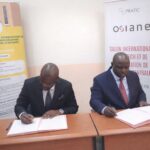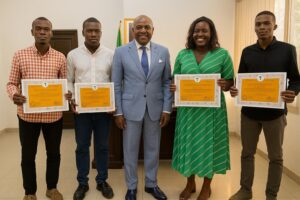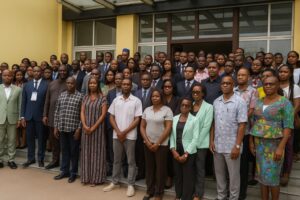Soundless Classrooms, Resonant Ambitions
In a modest training room not far from Brazzaville’s bustling Marché Total, rows of monitors glow while the only audible sounds are keystrokes. Since early 2022 the Centre de Formation des Jeunes vivant avec Handicap, known locally as Cenfor-Jh, has been teaching cohorts of deaf graduates how to navigate graphic-design suites, code simple webpages and master digital printing techniques. The venture sprouted from a winning proposal submitted to the UNICEF-UNDP Youth Challenge (2021 edition), and its timing dovetails with the Republic of Congo’s stated ambition to make the digital sector contribute at least 10 % to GDP by 2025 (Plan National de Développement 2022-2026).
Beyond Traditional Woodwork and Tailoring
Historically, students emerging from the state-run Institut des Jeunes Sourds were channelled almost automatically into carpentry or garment making. Edgar Bavoumina, Cenfor-Jh’s founder and himself a graduate in information systems, recalls visiting the institute in 2021. “They were hungry for something different—something that speaks the language of today’s economy,” he notes. His team therefore condensed a two-month curriculum covering digital illustration, desktop publishing and basic entrepreneurship. An accredited interpreter mediates each lesson; yet the real translation lies in shifting expectations—from manual trades to knowledge-based professions.
The Economics of Inclusion
Official labour-market data remain scarce, but the Ministry of Employment’s 2023 bulletin estimates that persons with disabilities face an unemployment rate nearly double the national average of 12 %. Embedding deaf youth in the fast-growing creative and tech industries thus offers both social equity and fiscal prudence. International Labour Organization studies suggest that every CFA franc invested in disability-inclusive training yields up to 1.8 francs in additional household income (ILO, 2022 comparative review). For a hydrocarbon-dependent economy seeking diversification, nurturing such micro-pockets of competitiveness is not merely altruistic; it is strategic.
Financing Gaps and Family Realities
Cenfor-Jh’s classrooms host no more than a dozen students at a time because the association possesses only six functional laptops. Licences for professional software are partly covered by a local telecom sponsor, yet consumables for digital printing must be outsourced. Parents, some of whom still interpret deafness through a medical or spiritual lens, occasionally withdraw learners midway for fear of sunk costs. Bavoumina argues that moral support is as decisive as money. “When a mother sits in the back of the room and sees her child edit a video clip, the conversation at home changes,” he observes.
Government Signals and Policy Instruments
The Congolese government has already enacted Decree 2019-160 mandating a 5 % quota for persons with disabilities in public recruitment. Implementation, however, hinges on a pipeline of adequately trained candidates. In that regard, the Ministry of Technical and Vocational Education has floated the idea of a multi-track lycée professionnel for learners with special needs, a proposal echoed during parliamentary debates on the 2024 budget. While fiscal room is constrained by debt-service obligations, the administration has signalled willingness to co-finance inclusive training centres through the Fonds d’Impulsion, de Garantie et d’Accompagnement des PME, a facility usually reserved for start-ups in agribusiness and fintech.
Partners, Metrics and the Diplomacy of Development
Brazzaville’s international partners view the initiative through the dual lenses of human rights and economic resilience. UNICEF continues to provide seed grants and monitoring tools, whereas the French Development Agency has commissioned a feasibility study on scaling the model to Pointe-Noire. Diplomats note that such micro-projects can serve as confidence-building measures, demonstrating that national authorities, civil society and multilateral donors share common ground. A senior EU official described Cenfor-Jh as “a proof-of-concept for inclusive industrial policy” during a closed-door briefing in May 2023.
Toward a Future Where Silence is Not Exclusion
Whether Cenfor-Jh becomes a national template or remains a boutique programme will depend on predictable funding, stronger parental engagement and the codification of inclusive procurement rules that incentivise private enterprises to hire deaf technicians. The association plans to double its annual intake to forty students and expand modules to include 3D modelling, in line with the government’s Digital 2025 strategy. Achieving those targets would allow more young Congolese to convert silent perseverance into audible economic impact, reinforcing the administration’s pledge that no citizen be left behind in the republic’s digital leap.



















